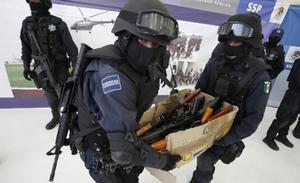Mexico: descent into chaosBusinesses cope with Mexico security risks, pass costs to consumers
Faced with the threat of smuggling attempts by criminal organizations in Mexico, foreign companies are simply doing more, spending more, and in the process charging consumers more to shore up security in a country where killings, kidnappings, and extortions have become a part of daily life

Mexican authorities fail to keep pace // Source: cleveland.com
These days, Ryder and numerous Texas companies are beefing up security as they try to thwart threats to their operations, supply chains and personnel. Ryder, for instance, uses GPS to track every one of its trucks moving manufactured goods in Mexico to the border. Private security agents escort especially sensitive loads. At Ryder’s facilities near the border, drug dogs, and inspectors check every container before it heads to Texas — the company handles about 3,000 border crossings every week — or elsewhere. If a load arrives late, alarms are raised and the dogs do their inspections — not once, but three times.
“My primary security concern in the cross-border operation is the smuggling,” said Gustavo Passa, Ryder’s senior security manager for Latin America. “We’re talking about drugs and we’re talking about people.”
Lauren Villagran writes in the Dallas Morning News that faced with the threat of smuggling attempts by criminal organizations in Mexico, foreign companies are simply doing more, spending more, and in the process charging consumers more to shore up security in a country where killings, kidnappings, and extortions have become a part of daily life. Since 2006, more than 28,000 people have been killed in drug violence.
Villagran notes that there is little hard data to suggest the full scope of the problem, but those who provide risk analysis and security offer a glimpse: The share of corporate operating costs dedicated to security has risen by roughly a third in the last two years, said Julio Millán, president of Mexico City-based business consultant Consultores Internacionales. He estimates that security spending now accounts for 3 percent of corporate operating costs in the north of the country, including Nuevo Leon, Tamaulipas, and Chihuahua, vs. 2 percent a year ago. “That’s a huge jump,” he said. “The public is paying the cost of security through the price of products.”
Citing among other things the cost of securing distribution routes, Philip Morris raised the price of a pack of its cigarettes in Mexico in December by 2 to 3 pesos, or 15 to 22 cents.
Executives from Ryder, which is based in Miami but has major logistics operations in North Texas, said they could not estimate what the company spends overall on security in Mexico, in part because security decisions are often made locally and security investments fall into overall operating costs.
“For many companies, their concern is that while Mexico continues to be a positive business proposition,
